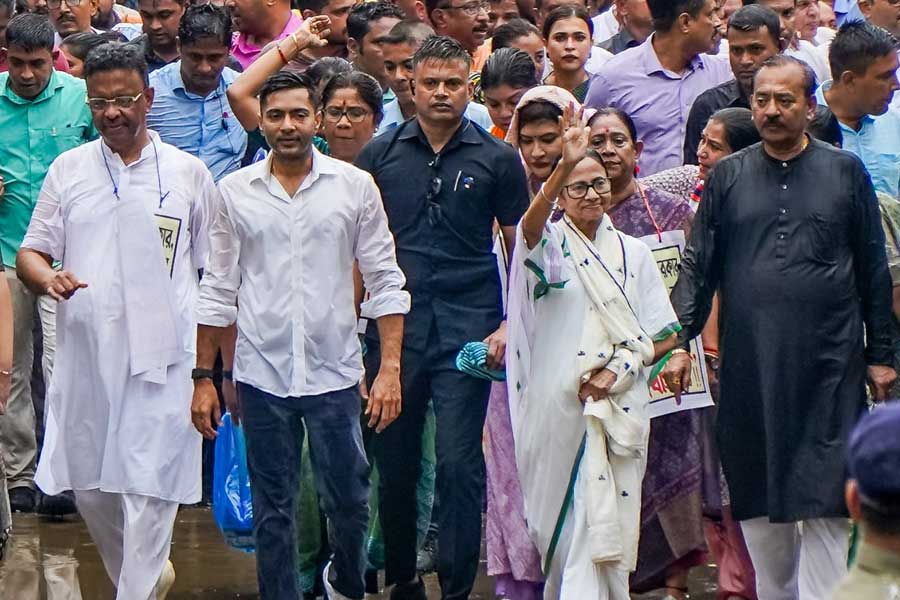As thousands marched through the streets in persistent rain, shouting slogans against the alleged targeting of Bengali speakers in other states, the conversations among bystanders revealed a city grappling with complex questions of identity, immigration, and belonging.
The rally, led by chief minister Mamata Banerjee, wound its way from College Square to Dorina Crossing via Bowbazar, Nirmal Chandra Street, and Lenin Sarani. While protesters denounced what they called “atrocities” on Bengali-speaking people in BJP-ruled states, those watching from the sidelines expressed sharply divided views.
Question of identity
P.S. Sahni, 65, watched the procession from outside his two-wheeler spare parts shop on Lenin Sarani. The Sikh businessman, whose forefathers migrated from what is now Punjab in Pakistan, drew a pointed comparison.
“If you are calling a person Bangladeshi for speaking Bengali, you might as well call me a Khalistani for speaking Punjabi,” said Sahni, who was born and raised in Calcutta. “I can speak fluent Bangla, but that doesn’t mean I should not speak in my mother tongue.”
He criticised what he sees as political manipulation: “India is a democracy. Indians should have the liberty to work anywhere in India. In the name of weeding out infiltrators, a dirty political game is being played. The powers that be want to polarise people for electoral gains.”
The hard line
Just 50 metres away, trader Dayanand Shaw stood outside his sanitation hardware store with a starkly different perspective. Shaw, whose family traces its roots to Uttar Pradesh, supported aggressive action against illegal immigration.
“Many Bangladeshis are staying in India illegally. Many have managed to get Indian documents as well. But they are feeding on our resources, depriving our own people,” Shaw said. “They should be identified and driven out. If some innocent people have to face harassment in that process, so be it.”
Near the intersection of BB Ganguly Street and Nirmal Chandra Street, local resident Sekhar Pal echoed this sentiment: “Bangladeshis should be weeded out, 100 per cent. When you do the right thing, some errors are acceptable.”
Common ground
Despite their differences on immigration policy, most bystanders agreed on one point: targeting people solely for speaking their native language crosses a line.
Even Shaw and Pal, who supported the crackdown on illegal immigrants, became defensive when asked about language-based profiling. “It is not right, I agree,” Pal admitted.
Personal stakes
The issue extends beyond politics for many families. A bar waiter from Murshidabad, who requested anonymity, explained his personal concerns: “My cousin works as a construction worker in the Delhi-NCR. He has all the valid documents like voter and Aadhaar cards. But he is worried, like many other Bengali workers.”
Muneer Shamsi, who sells wallets and umbrellas in Esplanade, put it simply: “Indians working hard should not be exploited in India, no matter the state.”
The political context
The controversy has erupted following central government instructions to all states to detect Bangladeshi infiltrators. Allegations have mounted that Bengali-speaking Indians — many of them Muslims — are being harassed in BJP-ruled states such as Delhi, Maharashtra and Odisha simply for their language.
This has become a key political issue in Bengal, with Mamata positioning herself as a defender of Bengali identity and linguistic rights.
Speaking from a makeshift stage at Dorina Crossing, the intersection of SN Banerjee Road and Chowringhee Road named after the Ma Dorina fabrics shop, she struck a balanced tone: “I respect all languages. I respect all religions, states and the people from there. I respect all citizens, but that does not mean you will torture Bengalis. I will not tolerate it. Just like I will not allow any torture of non-Bengalis here, I will not allow the torture of Bengalis outside Bengal.”
The rally and the conversations it sparked underscore the delicate balance India must strike between addressing legitimate security concerns about illegal immigration and protecting the fundamental rights of its own citizens to speak their native languages freely across the country.










